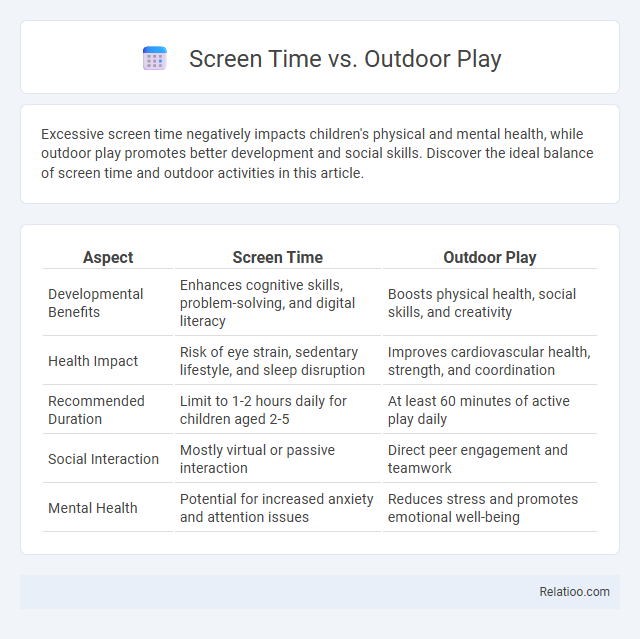Excessive screen time negatively impacts children's physical and mental health, while outdoor play promotes better development and social skills. Discover the ideal balance of screen time and outdoor activities in this article.
Table of Comparison
| Aspect | Screen Time | Outdoor Play |
|---|---|---|
| Developmental Benefits | Enhances cognitive skills, problem-solving, and digital literacy | Boosts physical health, social skills, and creativity |
| Health Impact | Risk of eye strain, sedentary lifestyle, and sleep disruption | Improves cardiovascular health, strength, and coordination |
| Recommended Duration | Limit to 1-2 hours daily for children aged 2-5 | At least 60 minutes of active play daily |
| Social Interaction | Mostly virtual or passive interaction | Direct peer engagement and teamwork |
| Mental Health | Potential for increased anxiety and attention issues | Reduces stress and promotes emotional well-being |
Introduction: Understanding Screen Time vs Outdoor Play
Balancing screen time and outdoor play is crucial for your child's physical and cognitive development, as excessive screen exposure can lead to decreased physical activity and social interaction. Research indicates that children who engage in regular outdoor play exhibit enhanced motor skills, better attention spans, and improved mental health compared to those with high screen time. Understanding the optimal interaction between screen use and outdoor activities helps promote healthier lifestyle habits and supports overall well-being.
Impact of Screen Time on Child Development
Excessive screen time negatively affects child development by impairing cognitive skills, reducing attention span, and limiting social interactions. Outdoor play fosters physical health, creativity, and emotional well-being, counteracting the sedentary and isolative effects of screens. Balancing screen exposure with regular outdoor activities promotes holistic growth and improves developmental outcomes.
Benefits of Outdoor Play for Physical Health
Outdoor play significantly enhances your physical health by promoting cardiovascular fitness, muscle strength, and coordination through active movement. Unlike extended screen time, which often leads to sedentary behavior and associated health risks, outdoor activities encourage natural sunlight exposure that boosts vitamin D levels essential for bone health. Regular engagement in outdoor play reduces obesity risk and improves overall well-being, making it a vital counterbalance to screen-based leisure.
Cognitive Effects: Digital Devices vs Nature Exploration
Cognitive effects of screen time reveal increased visual-spatial skills but potential declines in attention span and memory retention compared to outdoor play. Nature exploration promotes executive function development, creativity, and problem-solving through sensory-rich environments and physical activity. Digital devices often provide immediate feedback and multitasking opportunities, while outdoor play fosters long-term cognitive resilience and emotional regulation.
Emotional and Social Growth: Indoors and Outdoors
Screen time can limit opportunities for emotional and social growth by reducing face-to-face interactions, whereas outdoor play promotes empathy, communication skills, and emotional regulation through direct engagement with peers and nature. Balancing Your time between screen-based activities and outdoor experiences enhances social development, fostering resilience and cooperative behavior. Prioritizing outdoor play encourages a healthier emotional state and stronger social bonds essential for overall well-being.
Screen Addiction: Warning Signs and Prevention
Excessive screen time can lead to screen addiction, characterized by symptoms such as irritability when not using devices, neglect of outdoor play, and decreased social interaction. Warning signs include persistent preoccupation with screens, inability to reduce usage, and interference with daily activities or sleep patterns. Prevention strategies involve setting clear screen time limits, encouraging regular outdoor play to promote physical health, and fostering alternative hobbies that reduce reliance on digital devices.
Strategies to Balance Screen Use and Outdoor Activities
Balancing screen time and outdoor play is essential for your child's healthy development, promoting both cognitive skills and physical well-being. Effective strategies include setting consistent daily limits on screen use, encouraging outdoor activities by planning family outings or sports, and creating tech-free zones in your home to foster more active play. Integrating screen time with educational content alongside regular outdoor breaks supports a harmonious lifestyle and helps maintain your child's overall health.
Role of Parents in Encouraging Active Play
Parents play a crucial role in balancing screen time and outdoor play by setting clear limits on digital device use and actively encouraging physical activities that promote healthy development. Your involvement in organizing family outings and outdoor games can significantly increase your child's motivation to engage in active play, reducing sedentary screen habits. Creating a consistent routine that prioritizes outdoor experiences over screen exposure helps foster better physical health and social skills in children.
Innovative Ways to Make Outdoor Play Appealing
Innovative ways to make outdoor play appealing include integrating technology such as augmented reality games that encourage physical movement, creating interactive playgrounds with smart sensors, and organizing community events that blend screen-based challenges with outdoor activities. You can enhance your child's engagement by balancing screen time with these dynamic outdoor experiences, fostering both physical health and cognitive development. Prioritizing outdoor play with tech-infused elements helps reduce sedentary behavior while making exercise fun and stimulating.
Conclusion: Striking a Healthy Balance
Balancing screen time and outdoor play is essential for Your child's physical health and cognitive development. Prioritizing at least 60 minutes of outdoor activity daily helps reduce sedentary behavior and supports mental well-being. Integrating limited, purposeful screen time with regular outdoor play fosters a healthy lifestyle and optimal growth.

Infographic: Screen time vs Outdoor play
 relatioo.com
relatioo.com